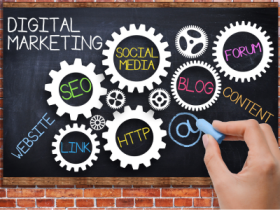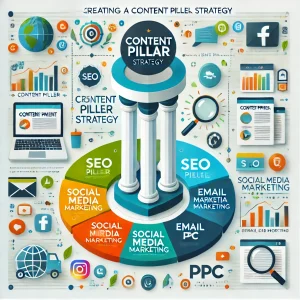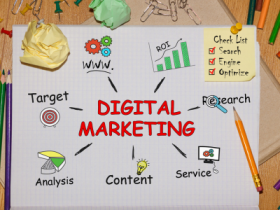Digital marketing refers to the use of digital channels, technologies, and strategies to promote products, services, or brands to a target audience. Unlike traditional marketing, which primarily relies on physical mediums like print, television, and radio, digital marketing operates in the virtual space—leveraging the internet, mobile devices, social media platforms, search engines, and other digital tools to connect with consumers.
Digital marketing is a cornerstone of modern business strategy, offering unparalleled reach and efficiency in engaging with audiences. It is no longer an option but a necessity for businesses aiming to thrive in today’s digital-first economy.
Evolution of Digital Marketing
The evolution of digital marketing can be traced back to the early days of the internet. As online technologies advanced, businesses began to explore new ways to reach their audiences:
- 1990s – The Advent of the Internet : The rise of the World Wide Web marked the beginning of digital marketing. Companies started creating websites to provide information and attract customers.
- 2000s – Search Engines and Email Marketing : Platforms like Google revolutionized how businesses connect with their audience. Search Engine Optimization (SEO) and Pay-Per-Click Advertising (PPC) became popular. Email marketing also emerged as a cost-effective way to engage customers.
- 2010s – Social Media Boom : Social media platforms like Facebook, Twitter, Instagram, and LinkedIn became integral for brand interaction and customer engagement. Content marketing and influencer marketing gained prominence during this period.
- 2020s – Data-Driven Strategies and AI : Today, digital marketing heavily relies on data analytics, artificial intelligence (AI), and machine learning to predict consumer behavior and personalize marketing strategies.
Key Components of Digital Marketing
Digital marketing encompasses a variety of strategies and tools. Some of the most significant components include:
1. Search Engine Optimization (SEO)
SEO involves optimizing a website to rank higher on search engine results pages (SERPs). The goal is to increase organic traffic by improving the website’s relevance and usability. Key SEO practices include:
- Keyword research
- On-page optimization
- Technical SEO
- Link building
Effective SEO ensures that your content aligns with user intent and search engine algorithms, driving higher visibility and traffic.
2. Content Marketing
Content marketing focuses on creating and distributing valuable, relevant, and consistent content to attract and retain a target audience. Examples include:
- Blog posts
- E-books
- Videos
- Infographics
High-quality, engaging content serves as the backbone of most digital marketing strategies, positioning businesses as industry leaders.
3. Social Media Marketing
Social media platforms are used to engage with audiences, promote products, and build brand awareness. Popular platforms include:
A well-executed social media strategy fosters community building and real-time customer interaction.
4. Pay-Per-Click Advertising (PPC)
PPC is a model of online advertising where advertisers pay a fee each time their ad is clicked. Google Ads and Facebook Ads are popular PPC platforms.
By targeting specific demographics, PPC ensures high ROI and immediate results for campaigns.
5. Email Marketing
Email marketing involves sending targeted messages to a subscriber list. It’s an effective way to nurture leads and maintain customer relationships.
Automation tools can further enhance email marketing, delivering personalized messages at scale.
6. Affiliate Marketing
This strategy involves partnering with affiliates who promote a company’s products or services for a commission on sales.
Affiliate marketing extends a brand’s reach while sharing the cost of customer acquisition with partners.
7. Influencer Marketing
Brands collaborate with influencers who have a significant following to promote their products or services.
This approach leverages the trust and authority influencers have built with their audiences.
8. Analytics and Data Insights
Digital marketing strategies rely on data insights to measure performance, track ROI, and optimize campaigns. Tools like Google Analytics and HubSpot play a critical role in this process.
Data-driven decisions minimize waste and maximize the effectiveness of marketing efforts.
Additional Insights with Real-World Examples
Case Study: Small Business Success with Social Media Marketing
One small bakery increased its sales by 150% within three months by leveraging Instagram reels to showcase behind-the-scenes footage of baking and interacting with customers through polls and Q&A sessions.
Practical Guide: Starting a Digital Marketing Campaign
- Define your target audience.
- Set clear and measurable goals.
- Choose appropriate channels (e.g., SEO, PPC, social media).
- Create engaging content tailored to your audience.
- Monitor performance using tools like Google Analytics.
- Adjust strategies based on insights.
Benefits of Digital Marketing
1. Cost-Effectiveness
Digital marketing offers a more affordable alternative to traditional marketing channels. Small businesses, in particular, can benefit from low-cost advertising options like social media marketing and email marketing.
2. Wider Reach
With billions of internet users worldwide, digital marketing allows businesses to reach a global audience.
3. Personalization
Advanced targeting options enable marketers to deliver personalized messages based on user behavior, demographics, and interests.
4. Measurable Results
Unlike traditional marketing, digital campaigns provide detailed analytics that measure success in real time.
5. Interactivity
Digital platforms facilitate direct interaction between brands and consumers through comments, shares, and direct messaging.
Interactive marketing fosters deeper customer engagement and loyalty.
Despite its advantages, digital marketing comes with challenges:
1. High Competition
The digital space is crowded, making it difficult for brands to stand out.
Differentiating through unique value propositions and niche targeting can address this issue.
2. Constantly Changing Algorithms
Platforms like Google and Facebook frequently update their algorithms, impacting visibility and engagement.
Regularly updating content and staying informed on algorithm changes is essential.
3. Data Privacy Concerns
Marketers must navigate stringent data protection regulations like GDPR and CCPA.
Transparency in data collection and adhering to regulations builds trust with audiences.
4. Keeping Up with Trends
The fast-paced nature of digital marketing requires continuous learning and adaptation.
Future Trends in Digital Marketing
As technology continues to evolve, digital marketing will adapt to new trends:
1. Artificial Intelligence (AI) and Machine Learning
AI-powered tools will enhance personalization, automate campaigns, and improve customer insights.
2. Voice Search Optimization
With the growing use of voice-activated devices, optimizing content for voice search will become essential.
3. Interactive Content
Interactive formats like quizzes, polls, and augmented reality (AR) experiences will engage audiences more effectively.
4. Sustainability Marketing
Brands focusing on eco-friendly practices and sustainability will resonate with environmentally conscious consumers.
5. Blockchain in Marketing
Blockchain technology will enhance transparency in advertising and address issues like ad fraud.
Conclusion
Digital marketing is a dynamic field that continues to transform the way businesses connect with their audience. Its adaptability, cost-effectiveness, and wide reach make it an indispensable tool in today’s business landscape. By understanding its core components, leveraging emerging technologies, and addressing challenges, businesses can craft impactful digital marketing strategies to achieve their goals.
Maximizing the potential of digital marketing requires an ongoing commitment to innovation, data-driven decision-making, and a customer-centric approach.






Leave a Reply